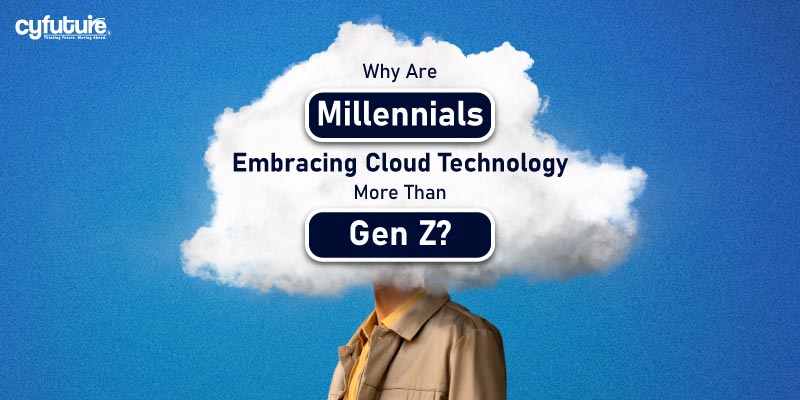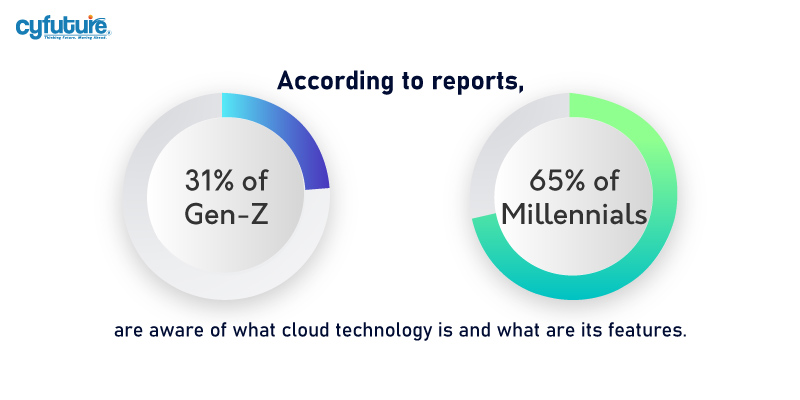Toggle navigation

We all are well aware that cloud technology has proven to be a digital revolution in the current technological era. But there is a significant catch in today’s era as there are two different generations that have varied exposure to technology. You got what we are trying to say right? Yes, we are talking about millennials and Gen Z. While both of these generations exist in today’s digital era, there is quite a difference between their exposure to technology. While millennials have witnessed cutting-edge inventions, Gen Z has been lucky to get their hands on the latest technologies.
Let us take an example here of personal computers. Back in the 1990s, computers were bulky, occupied large spaces, and could perform limited functions. Furthermore, only a few households were able to own a personal computer. But in today’s world, we have high-performing laptops with lightning-fast processors and GPUs that can manage heavy workloads like a piece of cake. Additionally, these compact laptops can easily be fit into your backpack which makes them extremely portable.
While millennials have witnessed this impressive transformation, Gen Z has got the opportunity to access these latest innovations instantly. But this case is not only for PCs or laptops or any other gadget, this is even valid for the digital revolution. Unlike Gen Z, millennials have witnessed a massive digital transformation and thus, they know its significance.
Let us take a moment to analyze some stats that showcase the exposure of technology to millennials and Gen Z.
Now that we have looked at the stats, let’s delve into the details and take a moment to understand millennials and Gen Z, along with their exposure to revolutionary cloud technology.
Millennials and Generation Z are two distinct groups of people who grew up in different times. Thus, this has influenced how they see the world and interact with technology. Millennials, also known as Generation Y are born between 1981 and 1996. They were the first to experience the internet and mobile phones and witness the digital revolution. They are often seen as tech-savvy and value things like work-life balance.
Generation Z, on the other hand, was born from the mid-1990s to the early 2010s. They are the true digital natives, growing up with the latest electronic gadgets, smartphones, and social media from a very young age. Gen Z got exposure to the latest technology at a very young age. They are known for being creative, entrepreneurial, and caring about issues like the environment.
Millennials, being the first to adapt to new technology, paved the way for the digital world we live in today. Generation Z, growing up surrounded by technology, sees it as a natural part of their lives. Furthermore, Generation Z is more likely to be a part of bigger digital revolutions and technical advancements that may take place in the future.
Both generations have unique qualities shaped by the times they grew up in. Understanding these differences is important for schools, businesses, and others to connect with and support each group in the best way possible. It’s like speaking their generational language to build better relationships and create a world where everyone feels heard and understood.

As millennials were able to witness this massive digital revolution, their strong acknowledgment of this technology can be understood. Millennials have grown up from traditional computing to cloud-based computing, thus getting immersed in this digital transformation. This early exposure, combined with their entry into a workforce witnessing the widespread integration of cloud solutions, cemented their appreciation for the efficiency and flexibility the cloud offers.
But in contrast, Generation Z or Gen Z, though somewhat familiar with the digital era, exhibits a more subtle enthusiasm due to the normalized presence of cloud technology in their upbringing. The workplace dynamics, which continually evolve and seamlessly integrate cloud tools into millennials’ daily workflows, contribute to their heightened interest. Recognizing these generational variations provides insight into the different levels of engagement with cloud technology, highlighting its continued impact on shaping the technological landscape.
One of the primary reasons millennials have embraced cloud technology more than Gen Z is the timing of their exposure to these advancements. The late 20th century and the early 21st century marked the emergence of the internet, paving the way for cloud-based services.
We all know that millennials were the first to witness this digital revolution. Since all the technological advancements took place in their presence, they were able to adapt to this digital shift. As cloud computing grew and became more advanced, millennials saw this opportunity and made themselves more tech-oriented. On the other hand, cloud computing was already a well-established innovation for Gen Z. Thus, Gen Z looks at cloud computing as a standard part of their lives.
Millennials grew up in an environment where cloud service providers were becoming increasingly common and entering the market. From email services and social media platforms to online storage solutions, millennials were quick to adopt these technologies as they became more sophisticated. This early integration cultivated a familiarity and comfort with cloud-based tools that Gen Z, in its early years, might not have experienced to the same extent. Gen Z could use social media and email right from an early age.
The professional landscape has played a key role in driving millennials’ interest in cloud technology. As this generation entered the workforce, they encountered a shifting paradigm where cloud-based solutions were gaining prominence across industries.
When millennials entered the job market, the entire world was undergoing a digital transformation. Cloud computing was becoming integral to business operations, offering scalable solutions for storage, collaboration, and data management. The need for remote access to work-related resources, facilitated by cloud technology, became particularly apparent in the millennial workforce. But in the case of Gen Z, all cloud-based solutions and technologies would already be established when they enter the job market.
Back in the day, millennials used physical and telephonic communication in their workplace. This not only was time-consuming but also inefficient as it resulted in lower productivity. However, as cloud technology became more relevant, millennials were quickly able to adapt to emails, remote access, and online sharing of documents and files. This not only made internal communication more effective but also fostered organizational growth.
While millennials joined the job market, they witnessed the integration of Artificial Intelligence and Automation into their daily tasks. All manual tasks that previously consumed significant time and resources were automated and reduced the overall workload. Furthermore, millennials quickly adapted to AI-based tools and automation software with further enhanced productivity. Cloud-based platforms often serve as the infrastructure for AI applications, data analytics, and machine learning, aligning with millennials’ expectations for tech-driven solutions in the workplace.
So to conclude, the fact is evident that the influence of cloud technology has been much more significant on millennials than Gen Z. This influence is due to multiple factors – from early exposure and workplace dynamics to the specific technological context in which each generation matured. While millennials were able to witness this digital revolution, Gen Z got this as a gift. As the technological landscape evolves, Gen Z is poised to inherit and further shape the future of cloud computing, building on the foundation laid by their predecessors. The interplay between generational experiences and technological progress will continue to define the trajectory of cloud technology adoption in the years to come.
As the cloud technology is well established, there is still a vast scope for improvements and advancements. There are multiple organizations that are leveraging the power of cloud technology and facilitating growth. One such organization, Cyfuture has showcased tremendous growth and excellence in the last 21 years in the space of cloud computing. Cyfuture employs a strong workforce of over 2000 professionals who thrive to provide cutting-edge cloud solutions. With thousands of clients, Cyfuture shows unparalleled commitment to customer satisfaction in providing state-of-the-art services. There are multiple organizations from various industries that have shown significant growth by collaborating with Cyfuture. If your organization is looking to enter the tech landscape, consider talking to our professionals and explore the era of new possibilities.